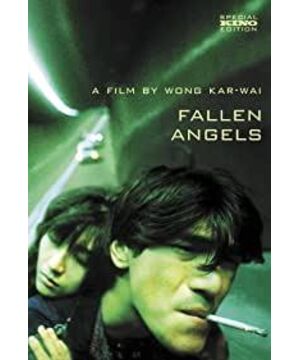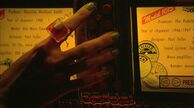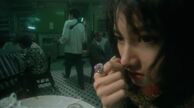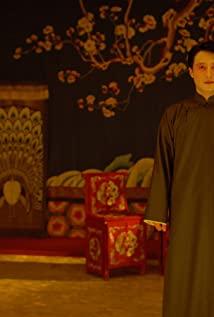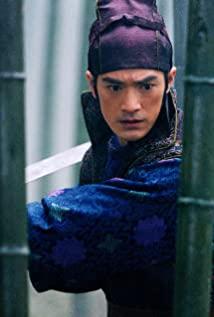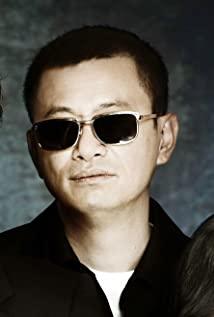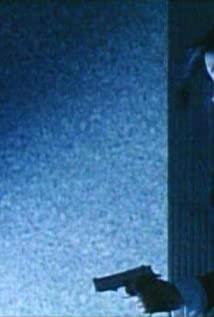Most of the themes of Wong Kar Wai's films revolve around one core, which is actually very related to modern youth. It is whether you need a stable life, whether you choose to start a family, and return to plain torture. It is a pity that the audience watching the movie did not enter this theme, but just watched a few beautiful scenes and read a few literary lines that they did not understand.
The pattern of "Fallen Angels" and "The True Story of Ah Fei" is very similar, and he also shaped the opposition between the two sides.
In "The True Story of Ah Fei", the characters are divided into two groups. Leslie Cheung and Tony Leung are a group, representing men who are scattered, have no fixed abode, are brightly dressed but have empty souls, who constantly replace their girlfriends but are unwilling to go to life. In the film, Leslie Cheung has two loves with the roles played by Maggie Cheung and Carina Lau respectively. If you pay attention to the turning point, you can find that the reason why he abandoned Maggie Cheung is that Maggie Cheung asked whether he should see his parents. This is a choice to return to ordinary life. Ah Fei, played by Leslie Cheung, resolutely chose to leave. It is the same with Carina Lau, when Carina Lau gave her the life choice of being raised as a little white face and happy, this is also to pull A Fei back to a dull life, A Fei resolutely shut Carina Lau within a minute. Outside the door, without hesitation. This fear of marriage and the fear of ordinary life is the sign of modern youth. In contrast, the images of Andy Lau and Jacky Cheung, who did not make many appearances in the film, are another group. They represent ordinary jobs, ordinary clothes, food and clothing, and the daily life of everyone, which forms a contrast with Ah Fei.
Understanding this, it's easy to watch "Fallen Angels" again.
1
The story takes place from 1992 to 1995. If you are familiar with Hong Kong movies, you are no stranger to it. The eve of Hong Kong's return to the motherland was a time when young and dangerous, killers, gangsters and even the police and bandits colluded in Hong Kong. In the film, Li Jiaxin and Li Jiaxin are a group of killers.
The main line of the film is still the two life choices of returning to the family and living in isolation, and it is also the ideological crisis that young people will face at the age of 30. Takeshi Kaneshiro and Liming form two opposites. Takeshi Kaneshiro partly reflects the rhythm of life of fatherly love, close relationship with others, and long-term and stable development. On the contrary, Dawn, his character in the film represents unmarried singles. The progress of the story is that Li Jiaxin changed from a wandering and helpless killer assistant to a desire for a stable life. However, Liming could not promise and was unwilling to promise this, so at the end she chose to have a relationship with Takeshi Kaneshiro (the son of her landlord) who she did not feel. ) on the motorcycle, his eyes returning blankly to life.
From an independent and free soul to the dullness of choosing to return to life with a single person, this is the difficult end that every young person needs to face.
We can cut from the most amazing part of the movie
There are at least two episodes of Li Jiaxin masturbating in the film. From the dullness and enjoyment at the beginning, to the sadness and crying at the end, the film uses a lot of shots to close-up the body. One side is Li Jiaxin, a single woman with a seductive figure; the other side is Karen Mok's image , inferior wigs, neurotic expressions, bizarre words. Whether it is the melancholy temperament played by Dawn in the film, or in reality, we, as moviegoers, will obviously choose the former instead of Karen Mok. This contrast is precisely to show the roles played by Li Jiaxin and Li Jiaxin. When they are in need of erotic desire, they cannot choose each other, and this is revealed in the opening monologue of Li Jiaxin, namely:
I worked with her for one hundred and fifty-five weeks. Today is the first time to sit together. We don't usually meet, because human feelings are difficult to control, and the best partner should not have personal feelings.
One hundred and fifty-five weeks, about three years. In other words, the two belong to a contractual relationship, but a long-term relationship will inevitably lead to feelings. However, for the scattered independent individuals, they cannot enter a normal life, nor do they want to enter a normal life. They would rather vent their lust or masturbate with the street girl they met at McDonald's, rather than have feelings with their collaborators, because they have feelings, Faced with the need to quit the unstable profession of killer, with feelings, there will be worries, and there will be worries, which means that it is inevitable to return to a normal life. Instead, it's better not to meet at all and not let this emotion arise.
To return to ordinary life is to have concerns. Regardless of Hong Kong Island in that era, or us now, in this chaotic era, we cannot afford the cost of marriage. As a single person, there is no fear. You can take a horizontal bar gun in front of you, take a bus, have a casual lunch in a street cafe, or even rent a noisy single room beside the MRT lane. And once we have a relationship, we must consider the other half's demands for life, and eventually we will enter an unconscious self-restraint, worrying about the boss, worrying about interpersonal relationships, asking for a good car, having three bedrooms and one living room, and having a decent job. An elementary school classmate who buys insurance in the film is actually a metaphor for the nervousness of the scattered unrestrained individuals. They seem to be free, but when they look back a little, it is the same kind of homogeneous life, homogeneous. Desires, and the pace of life that cannot be escaped.
The turning point of the film lies in Li Jiaxin's transformation. As Li Jiaxin's killer assistant, Li Jiaxin does not need to have face-to-face communication with him. In addition to surveying the site and drawing a roadmap for committing crimes, he will complete the work. But the twist of the story is her sudden interest in collaborators. This is not accidental, it may be understood as a female nature. In Wong Kar Wai's films, women are often the first to obey the rules of life. This return to real life is presented in various details, such as being willing to clean the temporarily rented hotel, kneeling down to wipe the floor, such as being willing to change the sheets, seemingly meaningless shots, in fact, every shot is directed towards watching the movie convey key information.
Therefore, what appears to be a loose film is actually very compact. At the 14th minute of the film, a change was thrown, that is, Li Jiaxin changed from picking up the trash to suddenly wanting to know about Dawn, so he searched various bars where the male protagonist went from the trash, speculated on the male protagonist's mood, and tried to understand this. Men, even in the end, masturbating on the man's bed. The male protagonist was accidentally injured in a subsequent shootout, and he also had a desire to retire. At the same time, he also realized that the female protagonist was secretly observing his actions. From this moment on, it means the breaking of the rhythm of a one-child life, and the inevitable coming of a snaring of daily life.
2
Compared with the killer Li Jiaxin and the killer assistant Li Jiaxin who did not have any emotions in the early stage, the landlord's son played by Takeshi Kaneshiro is the opposite of the two. He represents a thirst for life. Compared with the killer who doesn't want to contact anyone, even the killer and the assistant don't want to have feelings. Takeshi Kaneshiro's role is to have a strong desire to communicate with anyone. At the same time, they also long for life, for a normal and mediocre life. We can find that the image he metaphors is exactly the diligent and down-to-earth early Hong Konger images of Andy Lau and Jacky Cheung in The True Story of A Fei. female companions, while walking into the family.
"Don't be too caring, patient and selfish", "There is no free lunch in the world". This is the value of Takeshi Kaneshiro. Compared with the cold-blooded and ruthless killers, he is only responsible for taking orders and is concerned about his own interests and safety. As an ordinary person, Takeshi Kaneshiro requires himself to care for others, to be concerned about others, to work hard, and to work diligently. Whether it is forcing the homeless to do laundry, forcing the sale of vegetables to others, forcing others to wash their hair, or forcing the sale of ice cream, all of them clearly demonstrate a willingness to communicate with others and an effort to integrate into others. Video recordings, etc., all imply a desire to return to everyday life.
It is worth noting that compared to the elementary school classmates who appeared on the bus in the dawn part. There is also a man eating ice here. This man started to look sloppy and rambunctious, but then his family appeared when Takeshi Kaneshiro was eating ice. The man's words clearly revealed a sense of responsibility for his family. Dawn did not want to enter. This seemingly inexplicable ice-eating complex actually pushes out the core of the story again, that is, one side is a free single life, and the other side is a family man who has to take care of his family even for such trivial things as eating ice.
As the plot progresses, the role of Yang Caini appears again in the part of Takeshi Kaneshiro, which also implies a conflict between wandering and returning to life. Yang Cai Ni appeared in the image of a smoking little sister, and learned on the phone that her boyfriend was going to get married. From the beginning, I thought I would marry her, but then I realized that it was my boyfriend who married his close friend and abandoned her. So far, she, to a certain extent, has become the same drama camp as Takeshi Kaneshiro—that is, a character who hopes to return to a normal life but cannot. Unfortunately, Caini Yang has never been interested in Takeshi Kaneshiro from beginning to end. It also ended without a hitch. Compared with the panic of Li Ming and Li Jialing, Takeshi Kaneshiro and Cai Ni Yang are a kind of anxiety. Also facing marriage, single young people have different psychological entanglements.
3
Compared with the separate narratives of the first two parts, and the crisis of the two outlooks on life. The third part connects the two opposing personalities of Li Ming and Takeshi Kaneshiro. That is, as a single person, he finally chooses to compromise and return to life. The bleak dawn began to meet Takeshi Kaneshiro and began to ask about the cost of opening a store.
In the last 20 minutes of the straight film, with the help of Karen Mok, Li Jiaxin and Li Jiaxin officially met. But for single young people, whether it is Karen Mok's rambunctious neuroticism or Li Jiaxin's carefulness, there is no difference between the two. What it brings is ultimately a return of homogeneity, which is a return to life. Just as Leslie Cheung chose neither Maggie Cheung nor Carina Lau in Ah Fei, because fundamentally, there is no difference between them, and they all bring the same return. And Liming, like Leslie Cheung, is unwilling to give up the single life, which is undoubtedly the fear of the trivial daily marriage that is coming in reality. It is also an inevitable setting for both of them to die in the film.
Finally, we understand that the prerequisite for understanding a film is to clarify the timeline, character relationships, and core development clues. This is consistent with the analysis of history. If you ignore the entire historical development, and immerse yourself in trivial ancient history with costumes and emotional fragments, this will first deviate from the message the history writers want to convey. In exchange for the evaluation of the film, immersing in the details is just a lie that isolates the text and intoxicates itself.
Compared with understanding movies, the bigger problem is understanding oneself, whether single youths want to return to their daily lives, and how. Liming rejected Karen Mok in the second half of the movie, thinking that for her, "he is just a process". When he said, "Everyone needs a partner", he also said that "Everyone has a different understanding of a partner". This actually throws out a final split, that is, both wanting to return to life and fearing that the vortex of life will drag the self into the bottomless pit. The Hong Kong in the film is the age of the forest law of violence and crime. Now we are also in a broiler chicken that is powerless to compete with society. In the forest, the best option is to protect yourself. Ultimately unable to return to the dawn of life, dying in a celibate killer job. And Li Jiaxin, who wants to return to life, is united with another Takeshi Kaneshiro who has the same feeling (in the film, it is implied that the two feel that the winter this year is coming very early at the same time).
Maybe everyone who returns to life will eventually choose a person who is not their favorite and compromise with the most suitable person. Although I don’t know how far the road is and how long it will take to get off the bus, I just need to enjoy the warmth of winter in this minute. .
Related Links "The True Story of A Fei": The love between Sanhe and Foxconn female workers
No problem, just click "useful"
View more about Fallen Angels reviews


